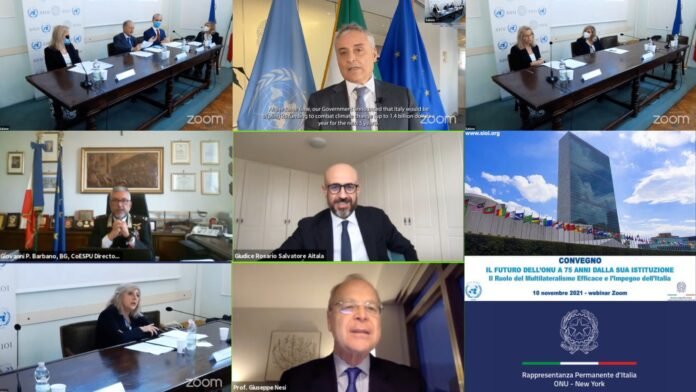ROME, NOVEMBER 10 – The UN Secretary General Antonio Guterres thanked Italy, “inestimable partner of the UN in all spheres of its activities, from peace to security, sustainable development, human rights, the fight against climate change” in a message sent to a conference organised by SIOI (Italian Society for International Organisations) to celebrate the 75th anniversary of the establishment of the United Nations.
In his message to the conference, Guterres recalled on the importance of multilateral instruments and cooperation in tackling the major challenges of our time, but also referred to the limited nature of the current multilateral system, “too focused on the short term”, another demonstration of the will and need for a reform of the UN system.
The President of SIOI and former Minister of Foreign Affairs and European Commissioner Franco Frattini opened the meeting, focused on the “Role of Effective Multilateralism and the commitment of Italy”, stressing the difficulties faced by multilateral instruments in the post-Cold War period. “I think that the tools of multilateralism today are those that better than any other method in international relations can address issues such as climate change, and in an age of pandemic, and post-pandemic we hope soon, how do we deal with the rising social inequalities in the world, or the health emergency?” he asked the audience opening the debate. He put a special focus on the distribution of vaccines, an opportunity missed by multilateral bodies, such as the WHO, to play a more central, representative and effective role in the international arena, according to Frattini.
After Guterres, another guest from the United Nations headquarters. Ambassador Maurizio Massari, Permanent Representative of Italy to the UN in New York, highlighted the primary role of Italy during 2021. Massari spoke of “the agenda of today”, in the multilateral context, pointing out to Italy’s G20 Presidency and the co-presidency of COP26, but also and above all the success of the Youth4Climate event in Milan. “The agenda of tomorrow” will see Italy engaged in the framework of ECOSOC in 2022, while “the agenda of the future” is again based on a reform of the UN Security Council and the increase of multilateral conferences on a two-year basis.
Just as Massari, also Foreign Minister Luigi Di Maio, in a message read by Deputy Director-General of Political Affairs and Director for the United Nations and Human Rights Gianluca Alberini, stressed the need for reform of a “more efficient, transparent, responsible, democratic and representative” UN system, reminding that Italy is currently the seventh largest United Nations contributor in terms of budget and the first in terms of peacekeepers contributions among Western countries.
Later, during a discussion on the three main themes of the conference, namely “peace and security, “rule of law” and “promotion and protection of human rights”, the speakers addressed young people, some of whom were present in the audience due to their participation in the Masters programme organised by SIOI, identified as a true target of the conference because of their future role.

The Director of the United Nations Interregional Crime and Justice Research Institute (UNICRI), Antonia Marie De Meo, focused on the promotion of peaceful, safe and inclusive societies through multilateralism, particularly in the context of her agency’s mandate, that is the fight against transnational crime as a real enemy of multilateralism. Carabinieri General and Director of the CoESPU (the Vicenza-based center of the Corps specialised in the maintenance of peace and international security), Giovanni Pietro Barbano, recalled the importance of the CoESPU as a multilateral instrument, and particularly in the training of personnel dedicated to the fight against international crime.
International Criminal Court Judge Rosario Salvatore Aitala explained the role of the ICC in the repression of individual crimes, reminding that his generation was born and raised with a belief in multilateralism, thought as the only viable solution after the horrors of the twentieth century. The current generation of students has not grown with such a cult of multilateralism due to historical situations and structural limitations, such as the absence of some leading States as parties to the Court and other multilateral instruments, but the hope is that young people understand “the legacy that we will try to leave them, and that they will have to cultivate, because the construction of a system of protection of rights and international justice is a frail creature in need of care”.
Professor of International Law at the University of Naples Federico II, Ida Caracciolo, focused on the law of the sea and its development thanks to multilateralism, which enabled the doctrine to move from a place of confrontation and manifestation of power to a space of cooperation and projection for States, even relatively small ones.
Lastly, connecting from New York where he is participating in the current session of the International Law Commission, Professor Giuseppe Nesi stressed the Italian role in the development of the protection of human rights in multilateral fora. The Italian agenda at the UN in legal matters is represented in particular by the promotion and signing of the Rome Statute, but Nesi also stressed the most recent instruments devoted to the protection of women and the fight against gender violence, real focal points of Italian foreign policy today. “Italy, far from promoting a moralist and fundamentalist policy, has instead always tried to create bridges between the various Member States, in order to allow the overcoming of prejudicial positions in the name of international solidarity”. (@giorgiodelgallo)

